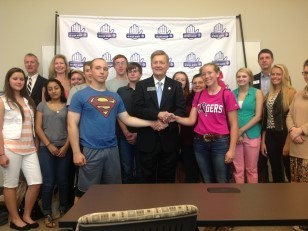"When I was young, you couldn't tell me what to do. 'Don't tell me what to do, even if it's going to save my life. Don't tell me what to do.' I was that way about the seat belt law when that came in. But finally I figured out that hey, this is gonna kill me," Murphy told the students. "But texting is a whole lot different. It's not just going to kill me, but it's going to kill someone else." Murphy asked the group who had texted and drove previously and almost every hand went up. He continued on to admit that he, too, has texted and drove in the past. "But I don't do it anymore," he said.
The law, called Caleb's Law, was created in honor of Caleb Sorohan, a student at what was then North Georgia College and State University. When he was home on Christmas break , he crashed into another vehicle head on while he was distracted by a text message. Murphy pushed the bill forward and it was accepted into law in 2010.
"We had a tough time with this bill, you would think that it's just common sense for you not to do that," said Murphy.
Cell phone provider AT&T, who also sponsored the event with Lanier Technical College, got on board with the law and created the "It Can Wait" program in 2009. By May of this year, over 100 organizations joined the initiative.
"We sell smart phones... but we also believe it's important to teach our customers how to use them appropriately," said AT&T NE Georgia Regional Director Paul Chambers. "We saw that this was becoming an epidemic of people using devices inappropriately so we started this campaign four years ago to say there's no text message that you can send or receive while you're driving that can't wait until you get to wherever you're going." He also said a driver that is also texting is 23 times more likely to get in an accident. "The average text message takes 5 seconds to type.... it's as if you've driven the length of a football field blindfolded."
Students in the audience particularly agreed with the idea, but admitted it was difficult in practice. "I don't think it should be done because it's dangerous," said Lanier Tech student Candace Moore. "I know I'm guilty of it, sometimes I'll be like 'Okay, I'll just send just a really quick text' and the iPhone has that microphone now and sometimes I'll do that, but it's still distracting." Moore said she told her friends not to text and drive but was still working on stopping herself.
An older student, Svetlana Remick, felt that texting at stop lights was okay. "I feel like I'm in control of the situation. I don't have to concentrate on the road. But I have a rule - I only say yes or no and I don't go into details," she said. "It's not really texting, more like checking."
At the end of the fair, AT&T representatives had a binder full of signatures belonging to students who decided to think twice about texting and driving. Representatives, along with Lanier Tech officials and Senator Murphy discussed ways to prevent texting and driving, including an Android Application that auto-replies to text messages with an "I'm driving" message using a GPS signal and the "Rubber Band" method developed by Morgan County High School in honor of Caleb Sorohan. The method utilizes a green rubber band placed around the phone when the driver gets in the car, as a reminder that the text can wait.
Chambers summed it up: "when we talk about texting and driving... we're talking about people's lives," Chambers said. "If you know somebody is driving, don't text them."
September 19 is the offical Drive 4 Pledges Day.

Car decals were given out to those who took the pledge

Senator Jack Murphy with Lanier Tech students

Senator Jack Murphy with Dawson County High School Students
http://accesswdun.com/article/2013/9/265423
